Statement by Ambassador Vassily A. Nebenzia, Permanent Representative of the Russian Federation to the United Nations, during the UN Security Council meeting on the United Nations peacekeeping operations and their potential contribution to the overarching goal of sustaining peace
We would like to thank Egypt for organizing today’s discussion. We hope it will promote an understanding of the subtleties of Security Council mandates in the areas of peacekeeping and peacebuilding, as well as defining the boundaries between those two important focuses of international support.
We are grateful to Deputy Secretary-General Mohammed, to Mr. Gert Rosenthal, Chair of the Advisory Group of Experts on the Review of the United Nations Peacebuilding Architecture, and to Mr. Youssef Mahmoud of the Independent High-level Panel on Peace Operations for their detailed briefings, which serve as an excellent basis for discussion.
Since the publication of the reports of those two groups (see S/2015/490 and S/2015/446), Member States have come a long way in developing specific, consensus decisions that are embodied in the annual reports of the Special Committee on Peacekeeping Operations of the General Assembly and in resolution 2282 (2016).
While that resolution, on reform of the peacebuilding architecture, did not change the fundamentals of the work involved, it outlined the specifics of its various tasks. It affirmed host Governments’ primary responsibility for identifying and implementing peacebuilding strategies and clearly established that sustaining peace is a shared task and responsibility that needs to be fulfilled by the Government and all other national stakeholders.
The approach to sustaining peace today is often a very broad one. First and foremost, it is inextricably linked to post-conflict reconstruction and the prevention of relapses into conflict. But before that can happen, it is essential that existing conflicts be settled and a robust peace assured. For that we need to understand a conflict’s root causes, each of which has its own genesis and individual specifics.
We believe in establishing clear tasks for missions aimed at eliminating the causes that are particular to a conflict. Loading up mandates with generic functions not only does not improve the peacekeeping operations’ effectiveness, it increases their financial cost. As far as we are concerned, there are specialized United Nations bodies and international mechanisms for dealing with such issues.
We do not support the policy of expanding the right of Blue Helmets to use force. While preventive action is important, excessive interest in it is dangerous, as is involving peacekeepers in offensive and counterterrorism operations. We do not want peacekeepers themselves to be dragged into conflicts.
Sustaining peace is impossible without a political process and national reconciliation, and should unquestionably be seen as key to peacekeeping operations. Today we were pleased to hear many delegations, including the People’s Republic of China, the United States, France, Sweden and many others, say that peacekeeping missions’ main goal is helping to achieve a political settlement. In some cases, there may be reasons for directing peacekeepers to assist in addressing issues such as disarmament, demobilization and integration, security sector reform and so forth.
We cannot support tying tasks that belong to sustaining peace, peacebuilding and peacekeeping directly to issues of sustainable development and achievement of the 2030 Agenda for Sustainable Development. They are connected, of course, but not always in a straight line. Peace by itself does not guarantee development, or vice versa.
In general, we base our understanding of the concept of sustaining peace, as enshrined in identical Security Council and General Assembly resolutions on the peacebuilding architecture, as a way to eradicate the root causes of conflicts and bring about national reconciliation and reconstruction.
